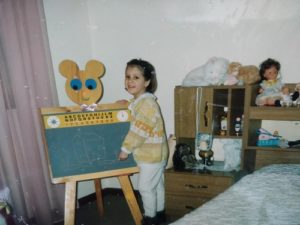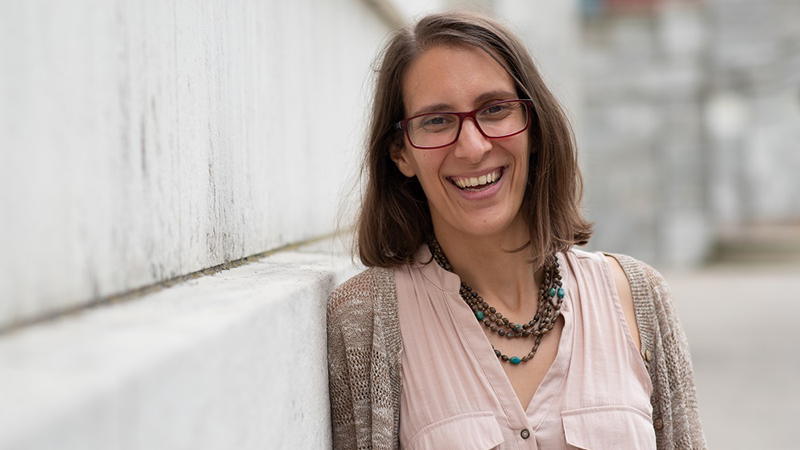Profile photo by Celia Muto
I’m fascinated by learning and decision-making. I study how neural activity in cortical areas changes while animals learn abstract associations during navigation. To do so, we use virtual reality, which is kind of like you’re playing a video game in which you are working your way through a maze, and where you need to learn different rules to reach your goals through the maze. And I look at how cortical activity changes while animals are learning these rules.

Sofia playing school as a child.
Did you always want to be a scientist? Did you have a different career idea when you were a kid?
As a kid, I was always very absorbed in playing and learning – especially pretending that I was a teacher. I have lots of pictures of this. I would line up my toys and then just teach them whatever I “learned” in kindergarten on my blackboard. It’s funny to think about this now in retrospect, because although I’m mostly doing research, I do love mentoring and teaching. And so when I hear this question, I think, “Oh, I didn’t think of careers as a kid but if there was any clue there, it was being a teacher”.
Was there someone in your life who really inspired you? Is that why you’re interested in mentorship?
I’ve always enjoyed explaining or transmitting knowledge to others and learning from others, and maybe that is because I’ve had really great teachers. Some of the people who most inspired me around the topics of science and teaching have been from as far back as my first primary school. I had teachers that were very passionate about the process of teaching. I remember one teacher, for example, who really stuck with me: my math teacher from high school. I remember feeling very inspired by her dedication and passion for mathematics—her passion was contagious.
What is the trait you admire most in others?
I’ve been very lucky in the mentors that I’ve had and in the colleagues that I’ve crossed paths with. I feel like I’ve learned a lot through the process of doing science with creative, curious and critical people and through good mentoring. With some people you develop patience and resilience. Others might have the ability to help you navigate moments in your work when it’s really important to not be too deflated when something doesn’t go exactly as you expected or there are difficulties that you didn’t predict. In moments like that, I really appreciate being surrounded by people who have this very contagious excitement for the day-to-day process of doing science.
I also love when someone is up for a great discussion. Those situations when you don’t necessarily agree, but someone is interested enough to have a long discussion about your distinct points of view. I feel like those are some of the moments where you grow the most as a scientist. I think the lack of interactions because of the pandemic has made me long more for this sort of informal discussions after a talk, when someone really liked some aspects of the talk and another person really didn’t enjoy it – and then you spend your lunchtime debating it.
What are your hobbies outside of the lab?
I’m a little bit of a social butterfly, or at least I was before the pandemic. I really like spending time with my friends, playing board games, finding new spots to eat great food and cooking. I enjoy making music a lot, especially singing; I often do this with my partner, so we will play instruments together, or he will play while I sing. And I love spending time outdoors, especially hiking. Obviously because of the pandemic, a lot of the time I would usually spend with friends in person has gone over to Zoom. I have spent an absurd amount of time playing board games online with my friends over the past year!
What are your hopes for the future?
That’s a tough one. For me, because of the pandemic, it’s been very hard to think about the future. I put all my energy into trying to make the best out of each week as it comes. I am very much looking forward to being able to be closer to my family in the future. I was born in Portugal and the long-term plan has been to return to Europe after my postdoc. Whatever I end up doing, professionally I hope it’s linked with science and with a big component of mentorship. That could be teaching, or if I were running a lab, I would want to dedicate enough time for mentoring, because I find it so important and really rewarding.
I hope at least if we get to go back to a somewhat normal or less constrained pattern of interactions, then that will also help a lot to think about how to move forward in a career in science. I think you had a question regarding what’s difficult about the work we do? I feel like this is a bit linked with the ideas for the future for me. While I was in a very fortunate position when the labs shut down, in that I had already collected a lot of data that I could then analyze from home, I have found it quite difficult working sort of in isolation for more than a year. And so, on a shorter timescale, my hope for the future is to be able to go back to doing science in a more collaborative way with other people in lab again. So maybe that’s a more achievable goal in the short term.

